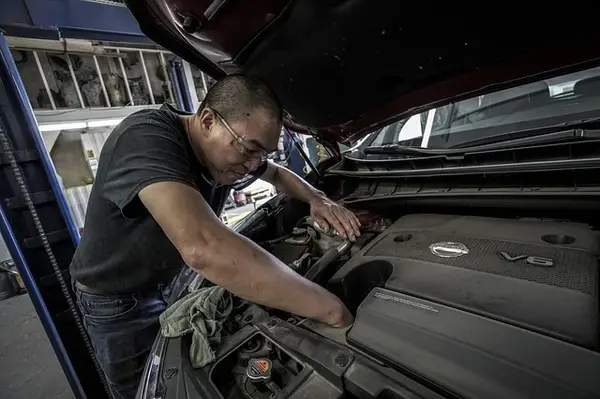The Official Cost Of Clearing Accidented Cars In Nigeria

Clearing accidented (damaged) cars in Nigeria is a complex but common practice, especially as these cars offer a budget-friendly alternative for buyers who want newer or more advanced vehicles at lower costs. However, the costs associated with importing and clearing accidented cars, particularly for customs duties, can be substantial. Here's a breakdown of what you should expect when clearing an accidented car in Nigeria.
Why Choose an Accidented Car?
Accidented cars, particularly those imported from countries like the U.S., offer several benefits, despite their potential repair needs. They are often newer models with advanced features that would cost significantly more if bought in pristine condition. Buyers are advised to verify the car’s accident history, get trusted evaluations, and assess repair costs before importation, as this can help in gauging the total investment needed to make the car roadworthy in Nigeria
Steps and Fees for Clearing Accidented Cars in Nigeria
-
Customs Duties and Levies: In Nigeria, accidented cars are subject to similar customs charges as undamaged used (Tokunbo) vehicles. The key charge for importing these vehicles includes a 35% import duty based on the car’s value, and an additional 35% levy, totaling a 70% cost on the assessed value. For example, if an accidented car is valued at N2,000,000, you will pay around N1,400,000 as clearing fees, covering both the duty and the levy.
-
Clearing Agent Fees: Given the procedural complexity, many importers use customs-accredited clearing agents. These agents charge a fee for their services, ensuring that all customs, terminal fees, and port documentation are processed smoothly. Hiring an agent can be a helpful move, as it can expedite the clearing process and reduce the risk of paperwork errors, which might otherwise lead to delays or increased fees.
-
Terminal and Shipping Fees: Upon arrival at Nigerian ports like Tin Can Island or Apapa in Lagos, additional fees may apply, including shipping company fees and terminal handling charges. These costs vary depending on the shipping line and the terminal used, and they are usually itemized separately from customs duties.
-
Vehicle Verification: The Nigerian Customs Service requires all imported vehicles, including accidented ones, to undergo verification at designated customs zones across the country. This verification process ensures that vehicles meet Nigerian import standards and helps in validating the declared value for accurate duty assessment.
Factors Influencing Clearing Costs for Accidented Cars
Several variables affect the overall clearing cost of accidented cars in Nigeria:
-
Extent of Damage: While the customs duty remains the same for all used vehicles, a severely damaged car may require a lower customs value assessment. However, obtaining a lower valuation for customs purposes can be challenging, as customs officials often use standard values based on the car’s make, model, and year, regardless of its condition.
-
Car Model and Year: The age and brand of the vehicle play a major role in determining customs valuation. High-end brands like Mercedes-Benz or BMW often have higher customs values, which leads to higher clearing fees. Older models generally have lower valuation rates, making them cheaper to clear than newer models.
-
Location of Entry and Port Congestion: Clearing fees may fluctuate depending on the port used for import. Major Nigerian ports like Tin Can and Apapa often face congestion, which can lead to additional storage charges if a car remains in the port longer than expected. Clearing cars through less congested land borders, like the Seme Border, might also influence the overall cost.
Estimated Costs for Common Car Models
To help you understand how the 70% duty and levy impacts various car models, here are some rough estimates:
-
Toyota Corolla 2005 (Value: N1,100,000) - Clearing Fee: N770,000
-
Toyota Corolla 2010 (Value: N1,500,000) - Clearing Fee: N1,050,000
-
Lexus RX 350 2010 (Value: N2,500,000) - Clearing Fee: N1,750,000
-
Mercedes-Benz GL 450 2007 (Value: N3,500,000) - Clearing Fee: N2,450,000.
Tips for Cost-Efficient Clearing of Accidented Cars
-
Engage Reputable Agents: A licensed clearing agent can streamline the process, reducing unexpected fees. Agents are also more familiar with customs valuation tactics, which can be helpful in cases where the car’s damage may warrant a lower duty assessment.
-
Verify the Vehicle Condition: Proper verification, including reviewing the car’s accident history and mileage, can prevent surprises. Using services that provide inspection reports or relying on trusted contacts abroad for pre-purchase evaluations can help in ensuring that the car’s declared condition matches the reality.
-
Prepare for Repair Costs: While clearing fees are significant, potential buyers of accidented cars must also budget for repair expenses. Accidented cars might require parts replacements, bodywork, or mechanical repairs, which can add to the overall investment.
-
Consider the Port of Entry: If possible, strategize your port of entry based on congestion levels. Using less busy border points, such as Seme, may reduce the time and incidental charges associated with port congestion at major Lagos ports.
Conclusion
While the process of clearing an accidented car in Nigeria is similar to that of a non-damaged used vehicle, the financial outlay is considerable. With a standard duty and levy rate of 70% of the car’s value, prospective buyers should carefully evaluate the total costs involved, including repairs and potential port-related expenses. By planning ahead and working with experienced agents, you can make informed choices that optimize your investment in an accidented vehicle.






